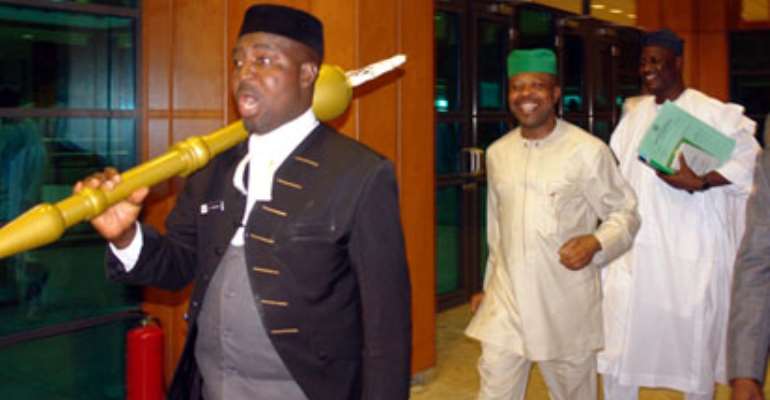We did not fix our salaries, RMAFC did -Reps

The House of Representatives has exonerated itself from blame over incessant criticisms against the jumbo pay of Senators and members of the House.
The House said that all queries and reservations concerning the matter should be referred to the Revenue Mobilisation Allocation and Fiscal Commission, which fixed the salaries and allowances of lawmakers.
Deputy House Majority Leader, Mr. Leo Ogor, who spoke on the controversial huge pay of federal legislators, said that the lawmakers' wage was computed by RMAFC after it considered several factors and took a decision on what should be the pay package, based on the powers conferred on it by law.
He said, 'We are tired of responding to the same issue every time; our explanations seem to be falling on deaf ears.
'We didn't fix our salaries and allowances; that is the role of RMAFC. If you think that our salaries and allowances are too much, ask the agency to slash what they recommended,' Ogor said.
The pay of lawmakers generated public discourse again following Monday's statement by a former Minister of Education, Mrs. Oby Ezekwesili, who said that the country had spent over N1.1tn on their upkeep since 2005.
Only recently, an analysis by The Economist rated Nigerian legislators the highest paid in the world, dwarfing countries like Japan, USA, Britain, Kenya and Ghana.
For example, a member of the House takes a monthly salary of between N900, 000 and N1.1m, besides a quarterly allowance of between N27.9m and N33m.
In addition, legislators receive car and furniture replacement loans and allowances every four years.
Ezekwesili had spoken at a one-day dialogue on the 'cost of governance in Nigeria.'
As a way of cutting cost, many Nigerians have called for a part-time legislature, as against the current practice whereby the 360 members of the House and 109 senators sit full time.
They are paid on a monthly basis, whether they work or not.
But Ogor said that attacking the legislature 'all the time' was an attempt to cripple democracy, adding that a part-time legislature would not work in the presidential system practiced by Nigeria.
According to him, a part-time legislature will promote dictatorship and allow the executive arm of government to operate without 'proper checks.'
He said, 'It is either we want to practice democracy or we do not. There is no presidential system of government anywhere where you reduce the legislature to part-time and expect to get results.
'The idea of the legislature is to enhance checks and balances, which is not possible when the legislature is not fully functional.
'We are there to act as a check on the excesses of the executive on a regular basis; that is the meaning of oversight as a legislative duty.'
The Chairman, House Committee on Media and Public Affairs, Mr. Zakari Mohammed, also opposed part-time legislature as a solution to the high cost of governance.
He observed that since 2011, the National Assembly's budget had remained at N150bn to run the bureaucracy, maintain the lawmakers and service the National Assembly Commission.
Mohammed pointed to the executive where he said the lion's share of public budget was spent annually but to which 'people turn a blind eye.'
